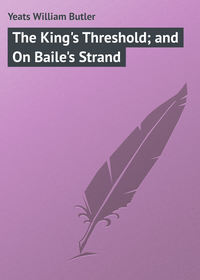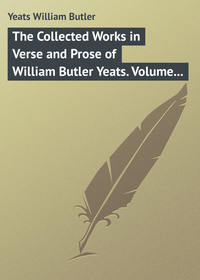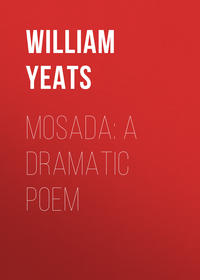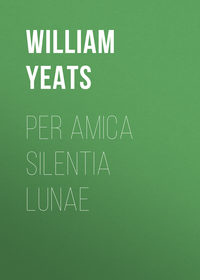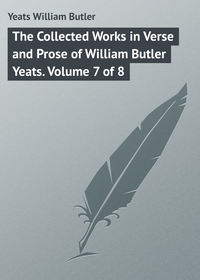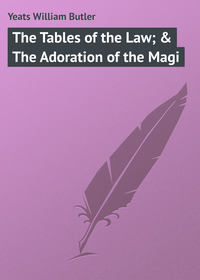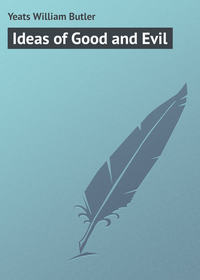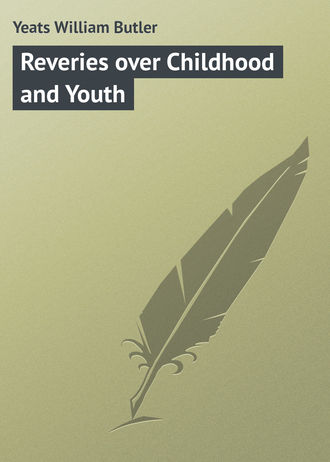 полная версия
полная версияReveries over Childhood and Youth
Once our debates roused a passion that came to the newspapers and the streets. There was an excitable man who had fought for the Pope against the Italian patriots and who always rode a white horse in our Nationalist processions. He got on badly with O’Leary who had told him that “attempting to oppress others was a poor preparation for liberating your own country.” O’Leary had written some letter to the press condemning the “Irish-American Dynamite Party” as it was called, and defining the limits of “honourable warfare.” At the next meeting, the papal soldier rose in the middle of the discussion on some other matter and moved a vote of censure on O’Leary. “I myself” he said “do not approve of bombs, but I do not think that any Irishman should be discouraged.” O’Leary ruled him out of order. He refused to obey and remained standing. Those round him began to threaten. He swung the chair he had been sitting on round his head and defied everybody. However he was seized from all sides and thrown out, and a special meeting called to expel him. He wrote letters to the papers and addressed a crowd somewhere. “No Young Ireland Society,” he protested, “could expel a man whose grandfather had been hanged in 1798.” When the night of the special meeting came his expulsion was moved, but before the vote could be taken an excited man announced that there was a crowd in the street, that the papal soldier was making a speech, that in a moment we should be attacked. Three or four of us ran and put our backs to the door while others carried on the debate. It was an inner door with narrow glass windows at each side and through these we could see the street-door and the crowd in the street. Presently a man asked us through the crack in the door if we would as a favour “leave the crowd to the workman’s club upstairs.” In a couple of minutes there was a great noise of sticks and broken glass, and after that our landlord came to find out who was to pay for the hall-lamp.
XXIX
From these debates, from O’Leary’s conversation, and from the Irish books he lent or gave me has come all I have set my hand to since. I had begun to know a great deal about the Irish poets who had written in English. I read with excitement books I should find unreadable to-day, and found romance in lives that had neither wit nor adventure. I did not deceive myself, I knew how often they wrote a cold and abstract language, and yet I who had never wanted to see the houses where Keats and Shelley lived would ask everybody what sort of place Inchedony was, because Callanan had named after it a bad poem in the manner of “Childe Harold.” Walking home from a debate, I remember saying to some college student “Ireland cannot put from her the habits learned from her old military civilization and from a church that prays in Latin. Those popular poets have not touched her heart, her poetry when it comes will be distinguished and lonely.” O’Leary had once said to me, “neither Ireland nor England knows the good from the bad in any art, but Ireland unlike England does not hate the good when it is pointed out to her.” I began to plot and scheme how one might seal with the right image the soft wax before it began to harden. I had noticed that Irish Catholics among whom had been born so many political martyrs had not the good taste, the household courtesy and decency of the Protestant Ireland I had known, and yet Protestant Ireland had begun to think of nothing but getting on. I thought we might bring the halves together if we had a national literature that made Ireland beautiful in the memory, and yet had been freed from provincialism by an exacting criticism, an European pose. It was because of this dream when we returned to London that I made with pastels upon the ceiling of my study a map of Sligo decorated like some old map with a ship and an elaborate compass and wrote, a little against the grain, a couple of Sligo stories, one a vague echo of “Grettir the Strong,” which my father had read to me in childhood, and finished with better heart my “Wanderings of Oisin,” and began after ridding my style of romantic colour “The Countess Cathleen.” I saw that our people did not read, but that they listened patiently (how many long political speeches have they listened to?) and saw that there must be a theatre, and if I could find the right musicians, words set to music. I foresaw a great deal that we are doing now, though never the appetite of our new middle-class for “realism,” nor the greatness of the opposition, nor the slowness of the victory. Davis had done so much in the four years of his working life, I had thought all needful pamphleteering and speech-making could be run through at the day’s end, not knowing that taste is so much more deeply rooted than opinion that even if one had school and newspaper to help, one could scarcely stir it under two generations. Then too, bred up in a studio where all things are discussed and where I had even been told that indiscretion and energy are inseparable, I knew nothing of the conservatism or of the suspicions of piety. I had planned a drama like that of Greece, and romances that were, it may be, half Hugo and half de la Motte Fouqué, to bring into the town the memories and visions of the country and to spread everywhere the history and legends of mediaeval Ireland and to fill Ireland once more with sacred places. I even planned out, and in some detail, (for those mysterious lights and voices were never long forgotten,) another Samothrace, a new Eleusis. I believed, so great was my faith, or so deceptive the precedent of Young Ireland, that I should find men of genius everywhere. I had not the conviction, as it may seem, that a people can be compelled to write what one pleases, for that could but end in rhetoric or in some educational movement but believed I had divined the soul of the people and had set my shoes upon a road that would be crowded presently.
XXX
Someone at the Young Ireland Society gave me a newspaper that I might read some article or letter. I began idly reading verses describing the shore of Ireland as seen by a returning, dying emigrant. My eyes filled with tears and yet I knew the verses were badly written – vague, abstract words such as one finds in a newspaper. I looked at the end and saw the name of some political exile who had died but a few days after his return to Ireland. They had moved me because they contained the actual thoughts of a man at a passionate moment of life, and when I met my father I was full of the discovery. We should write out our own thoughts in as nearly as possible the language we thought them in, as though in a letter to an intimate friend. We should not disguise them in any way; for our lives give them force as the lives of people in plays give force to their words. Personal utterance, which had almost ceased in English literature, could be as fine an escape from rhetoric and abstraction as drama itself. My father was indignant, almost violent, and would hear of nothing but drama. “Personal utterance was only egotism.” I knew it was not, but as yet did not know how to explain the difference. I tried from that on to write out of my emotions exactly as they came to me in life, not changing them to make them more beautiful, and to rid my syntax of all inversions and my vocabulary of literary words, and that made it hard to write at all. It meant rejecting the words or the constructions that had been used over and over because they flow most easily into rhyme and measure. Then, too, how hard it was to be sincere, not to make the emotion more beautiful and more violent or the circumstance more romantic. “If I can be sincere and make my language natural, and without becoming discursive, like a novelist, and so indiscreet and prosaic,” I said to myself, “I shall, if good luck or bad luck make my life interesting, be a great poet; for it will be no longer a matter of literature at all.” Yet when I re-read those early poems which gave me so much trouble, I find little but romantic convention, unconscious drama. It is so many years before one can believe enough in what one feels even to know what the feeling is.
XXXI
Perhaps a year before we returned to London, a Catholic friend brought me to a spiritualistic seance at the house of a young man who had been lately arrested under a suspicion of Fenianism, but had been released for lack of evidence. He and his friends had been sitting weekly about a table in the hope of spiritual manifestation and one had developed mediumship. A drawer full of books had leaped out of the table when no one was touching it, a picture had moved upon the wall. There were some half dozen of us, and our host began by making passes until the medium fell asleep sitting upright in his chair. Then the lights were turned out, and we sat waiting in the dim light of a fire. Presently my shoulders began to twitch and my hands. I could easily have stopped them, but I had never heard of such a thing and I was curious. After a few minutes the movement became violent and I stopped it. I sat motionless for a while and then my whole body moved like a suddenly unrolled watch-spring, and I was thrown backward on the wall. I again stilled the movement and sat at the table. Everybody began to say I was a medium, and that if I would not resist some wonderful thing would happen. I remembered that my father had told me that Balzac had once desired to take opium for the experience sake, but would not because he dreaded the surrender of his will. We were now holding each other’s hands and presently my right hand banged the knuckles of the woman next to me upon the table. She laughed, and the medium, speaking for the first time, and with difficulty, out of his mesmeric sleep, said, “tell her there is great danger.” He stood up and began walking round me, making movements with his hands as though he were pushing something away. I was now struggling vainly with this force which compelled me to movements I had not willed, and my movements had become so violent that the table was broken. I tried to pray, and because I could not remember a prayer, repeated in a loud voice
Of Man’s first disobedience and the fruitOf that forbidden tree whose mortal tasteBrought death into the world and all our woe…Sing, heavenly muse.My Catholic friend had left the table and was saying a Pater Noster and Ave Maria in the corner. Presently all became still and so dark that I could not see anybody. I described it to somebody next day as like going out of a noisy political meeting on to a quiet country road. I said to myself, “I am now in a trance but I no longer have any desire to resist.” But when I turned my eyes to the fireplace I could see a faint gleam of light, so I thought “no, I am not in a trance.” Then I saw shapes faintly appearing in the darkness & thought, “they are spirits;” but they were only the spiritualists and my friend at her prayers. The medium said in a faint voice, “we are through the bad spirits.” I said, “will they ever come again, do you think?” and he said, “no, never again, I think,” and in my boyish vanity I thought it was I who had banished them. For years afterwards I would not go to a seance or turn a table and would often ask myself what was that violent impulse that had run through my nerves? was it a part of myself – something always to be a danger perhaps; or had it come from without, as it seemed?
XXXII
I had published my first book of poems by subscription, O’Leary finding many subscribers, and a book of stories, when I heard that my grandmother was dead and went to Sligo for the funeral. She had asked to see me but by some mistake I was not sent for. She had heard that I was much about with a beautiful, admired woman and feared that I did not speak of marriage because I was poor, and wanted to say to me “women care nothing about money.” My grandfather was dying also and only survived her a few weeks. I went to see him and wondered at his handsome face now sickness had refined it, and noticed that he foretold the changes in the weather by indications of the light and of the temperature that could not have told me anything. As I sat there my old childish fear returned and I was glad to get away. I stayed with my uncle whose house was opposite where my grandfather lived, and walking home with him one day we met the doctor. The doctor said there was no hope and that my grandfather should be told, but my uncle would not allow it. He said “it would make a man mad to know he was dying.” In vain the doctor pleaded that he had never known a man not made calmer by the knowledge. I listened sad and angry, but my uncle always took a low view of human nature, his very tolerance which was exceedingly great came from his hoping nothing of anybody. Before he had given way my grandfather lifted up his arms and cried out “there she is,” and fell backward dead. Before he was dead, old servants of that house where there had never been noise or disorder began their small pilferings, and after his death there was a quarrel over the disposition of certain mantle-piece ornaments of no value.
XXXIII
For some months now I have lived with my own youth and childhood, not always writing indeed but thinking of it almost every day, and I am sorrowful and disturbed. It is not that I have accomplished too few of my plans, for I am not ambitious; but when I think of all the books I have read, and of the wise words I have heard spoken, and of the anxiety I have given to parents and grandparents, and of the hopes that I have had, all life weighed in the scales of my own life seems to me a preparation for something that never happens.




